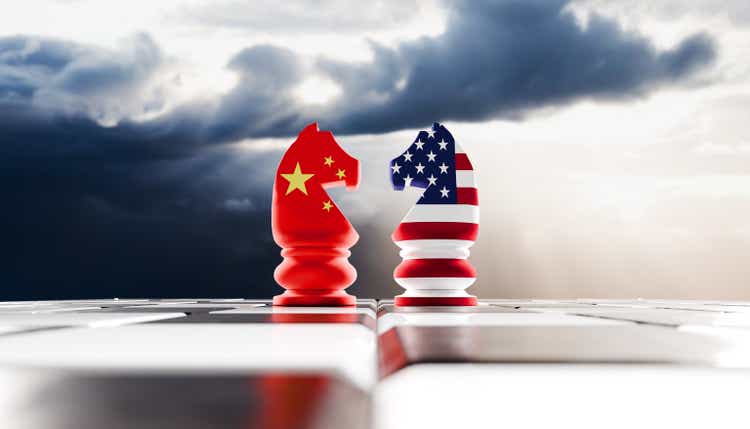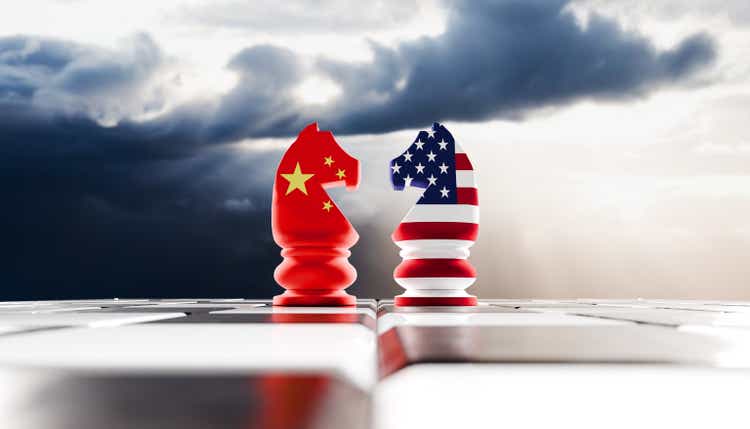
J Studios/DigitalVision via Getty Images
With President-elect Donald Trump proposing tariffs as high as 60%- 100% on goods imported from China, Wall Street analysts and company CEOs weighed in on how its potential implementation could impact the MedTech industry.
Citing remarks from companies in its MedTech coverage, Wells Fargo analysts led by Larry Biegelsen noted that most had limited to no manufacturing footprint in China, even though their median sales exposure to China stood at ~3% of revenue.
Biegelsen argued that GE HealthCare (NASDAQ:GEHC) and Merit Medical (MMSI) had the highest sales exposure to China at 12% each, while Solventum (SOLV), Envista (NVST), and Bausch + Lomb (BLCO) trailed with 8% each.
“Some of the large-cap companies noted their global footprint that reduces overdependency on a single geography,” he wrote. Several MedTech firms echoed similar thoughts this week after issuing their quarterly results following Trump’s successful reelection bid.
Company remarks
Becton Dickinson (NYSE:BDX) CEO Tom Polen said during the company’s Q4 earnings call on Thursday that “from a China perspective, our strategy has always been strong local manufacturing in China for China.” “Our network is set up to serve local markets with heavy local manufacturing in many cases,” he noted, adding, “We’re a very strong domestic manufacturer in the U.S.”
Joe Almeida, CEO of Baxter International (NYSE:BAX), argued that China accounts for less than 2% of company sales” and added, “But we do not specifically make products in China for the U.S.”
3M (MMM) Spinoff Solventum (SOLV) offered similar views. “When I think about what we actually bring in from China, it’s a relatively small number,” CEO Bryan Hanson said, noting that the company’s China sales make up slightly over 5% of its global business.
“And as a result of that, just given what we know, I really don’t see tariffs as being a major impact to our business,” he added.
When asked about potential tariffs, Dan Carestio, CEO of sterilization services provider STERIS (STE), noted that his company’s global contract sterilization business has resorted to reshoring and front-shoring to offset any impact.
“We seen we’ve seen enormous growth in our Asia Pacific region” over the past two years, Carestio said, adding, “It’s more of a front-shoring operation in anticipation of some challenges that might or may not occur as it relates to China.”
However, there are some concerns in the industry. According to Wells Fargo, pulse oximetry company Masimo (MASI) has a “meaningful portion” of its sensor components imported from China.
Déjà vu
Looking back at company commentary during the implementation of 2018-19 China tariffs under Trump, Wells Fargo said that most firms in its coverage with China exposure had cited a modest impact. Even Mexican tariffs in 2019 had no “material impact,” analyst Biegelsen added.
BD CEO Polen agreed, noting, “When we saw this dynamic that happened in the past, we didn’t see significant impacts from that.”
Insulin pump maker Tandem Diabetes (TNDM) said the company has made potential tariffs on imports a priority issue.
“We have a wide supply chain that does cross into some of the Asian countries that could potentially be problematic, CEO John Sheridan noted, adding, but we have the flexibility to move things as we need to.”
“So, we’re definitely thinking about it; it’s sort of top-of-mind right now,” Sheridan said.
Too early to panic?
For others, it’s too early to assess any impact from potential tariffs, and Wells Fargo expects that there could be exceptions for certain medical components or products. Despite its reliance on China for sensor materials, Masimo (MASI) has said “it’s too early to tell potential tariff impact,” according to Wells Fargo.
Michael Sen, CEO of the German dialysis firm Fresenius (NYSE:FMS), agreed. “We have all heard the statements on tariffs and the like,” Sen said during the recent earnings call, adding, “It’s way too premature as to what the agenda of the new president will be.”
